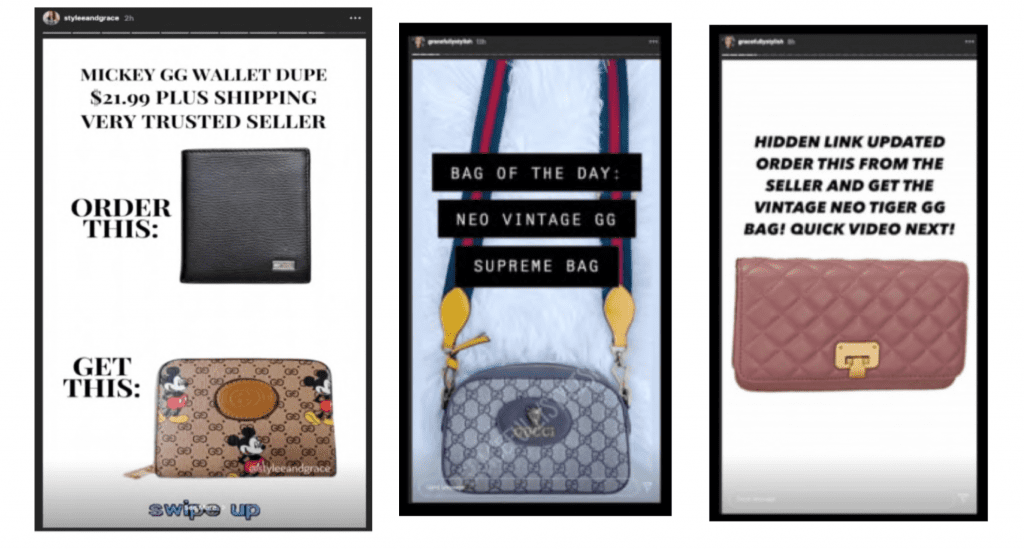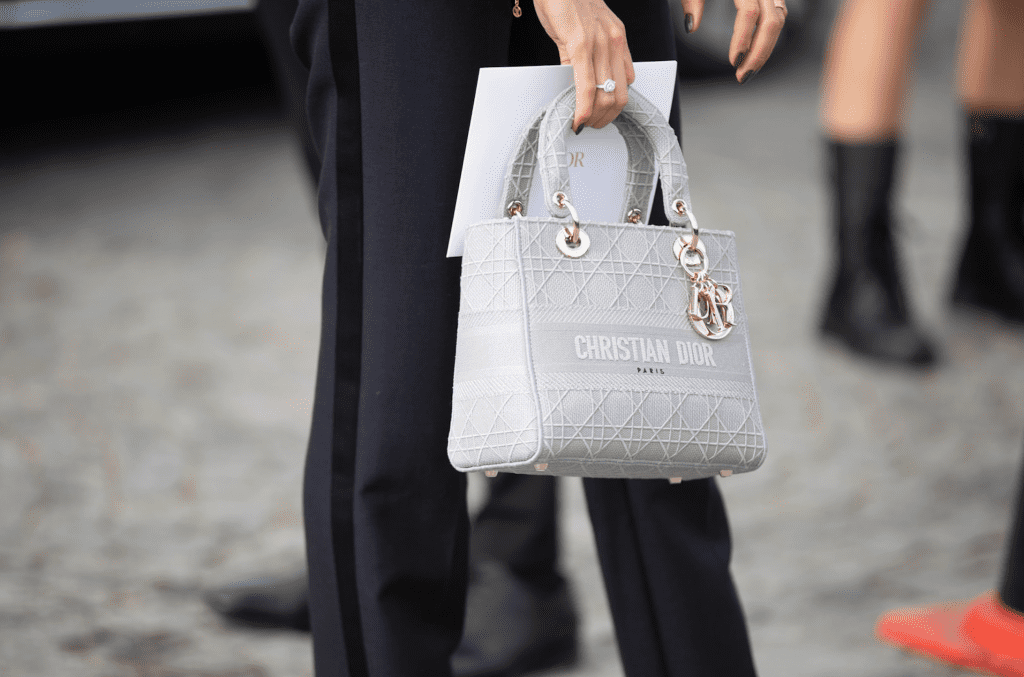Amazon is cracking down on the sale of counterfeits on its platform by way of a new lawsuit that involves two influencers, nearly a dozen Amazon third-party sellers, and an alleged scheme to peddle fakes under the radar of its increasingly robust anti-counterfeiting controls. According to the complaint that it filed with the U.S. District Court for the Western District of Washington on Thursday, Amazon claims that influencers Kelly Fitzpatrick and Sabrina Kelly-Krejci, along with 11 Amazon marketplace sellers, are on the hook for the “unlawful and expressly prohibited advertisement, promotion, and/or sale of counterfeit luxury products on Amazon.com” in violation of Amazon’s policies, and federal and state law.
In the newly-filed complaint, Amazon claims that Fitzpatrick and Kelly-Krejci have “engaged in a sophisticated campaign of false advertising” in connection with which they have “conspired” with sellers on Amazon’s marketplace to evade Amazon’s anti-counterfeiting protections by promoting counterfeit luxury goods – from Gucci belts to Dior handbags – on Instagram, Facebook, TikTok, and their own websites.
At the heart of the parties’ ploy is the discrepancy between the actual Amazon listings posted by the defendant sellers and the goods that the two influencers are actually promoting. Amazon claims in its 63-page filing (as first reported by CNBC) that scheme goes down like this: the seller defendants list generic accessories on their Amazon storefronts, such as logo-less “Women’s black PU leather large totes.” The twist is that these product listings – which do not infringe any other brands’ trademark-rpotected names or logos – are actually fronts for the counterfeit products that are actually being offered up for sale.
Now enter Fitzpatrick and Kelly-Krejci, who – instead of promoting the generic handbags, belts, sunglasses, and wallets, which are just “false placeholder[s]” for the counterfeit goods that are actually being sold, per Amazon – reveal the true nature of the products,” namely, that the otherwise legally-above-board accessories listed by the sellers are, in fact, counterfeit versions of accessories from Louis Vuitton, Chanel, Versace, Gucci, and Dior, among others. To be exact, Amazon claims that beginning in November 2019, Fitzpatrick, who was previously a member of Amazon’s Influencer Program, and Kelly-Krejci have been posting photos of on their social media accounts of the same generic, non-branded products alongside the equivalent counterfeit product with the text, “Order this/Get this,” with “Order this” referring to a generic product “falsely advertised” on Amazon, and “Get this” referring to the counterfeit trademark-bearing “dupe” that consumers will receive.
Amazon asserts that Fitzpatrick and Kelly-Krejci – both of whom were previously been blocked by Amazon for promoting counterfeits on the Seattle-based e-commerce titan’s third-party marketplace – “refer to the products they promote as ‘dupes,’ a fashion industry term that connotes items that may have similarities to a designer item but that do not copy logos or trademarked features.” However, as the e-commerce behemoth aptly argues, dupes are “not what Fitzpatrick and Kelly-Krejci are advertising to their followers: these so-called ‘dupes’ are obviously counterfeit goods that blatantly copy the registered trademarks of luxury brands.”

Amazon asserts that the two influencers – who are “by their own admission, close business associates in the world of counterfeit ‘dupes'” – publish “videos, photographs, and detailed descriptions of clearly infringing products on their social media [accounts], and other websites and apps.” In furtherance of the scheme, they allegedly direct their followers to use “hidden links” to Amazon listings – which, as Fitzpatrick has explained, means “you order a certain product that looks nothing like the designer dupe in order to hide the item from getting taken down [by Amazon] and orders being cancelled” – in order to purchase the counterfeit goods from sellers on Amazon.
The “hidden links” enable consumers to “order a seemingly non-infringing item in order to get a counterfeit fashion product – the very essence of false advertising, as the product [the] defendants are advertising on Amazon is simply a false placeholder designed to evade Amazon’s counterfeit detection systems,” Amazon claims. “Once the orders are placed, the seller defendants and other bad actors then ship [the] counterfeit products to customers.”
Hardly an unaffiliated group, Amazon claims that many of the defendants are connected. For instance, Amazon asserts that “far from being a mere promoter of others’ counterfeit wares,” Amazon asserts that Islip, New York-based Fitzpatrick, in particular, “boasts about her close business relationship with the bad actors whose counterfeit sales she promotes in the Amazon store.” For example, Amazon alleges that Fitzpatrick “described how she was able to help her followers with returns from Amazon sales based on her personal relationship with the sellers, warning potential buyers from a non-Amazon seller, ‘Please know that I am not in contact with these sellers and cannot help you with returns like I do with sellers on Amazon and Instagram.”
According to Amazon, Fitzpatrick “even describes how she directly requests specific counterfeit products from sellers, describing one counterfeit Gucci belt as ‘actually the very first item I requested a seller on amazon to stock!'” More than that, Amazon argues that “some [of the] defendant sellers also appear to be closely related. For example, on February 27, 2019, [two of the sellers] both logged into their Amazon selling accounts through the same IP address.”
In a statement that coincides with the case filing, Cristina Posa, Associate General Counsel and Director for Amazon’s Counterfeit Crimes Unit, said that “these defendants were brazen about promoting counterfeits on social media and undermined the work of legitimate influencers.” She further asserts, “This case demonstrates the need for cross-industry collaboration in order to drive counterfeiters out of business. Amazon continues to invest tremendous resources to stop bad actors before they enter our store and social media sites must similarly vet, monitor, and take action on bad actors that are using their services to facilitate illegal behavior.”
The case comes as Amazon has ramped up its efforts to fight fakes on its platform both by way of an array of internal initiatives, such as its counterfeiting-specific Project Zero, as well as via a growing number of lawsuits, including ones filed in connection with rightsholders, such as Italian fashion brand Valentino and beauty company KF Beauty. Both suits are still underway.
Such action is part of an enduring public-facing campaign from Amazon, in furtherance of which the company is seemingly seeking to bolster consumer and brand confidence in the $1 trillion company. Beyond the relevant monetary and equitable remedies to be gained from such ongoing litigation, Amazon is looking to send a clear message to consumers and potential brand partners, alike, about its stance when it comes to enforcement. This is particularly relevant given Amazon’s recent roll out of its “Luxury Stores” venture, the retail giant’s latest effort to wade into the fashion space.
Setting out claims of false designation of origin and violation of Washington Consumer Protection Act against all of the defendants, and contributory false designation of origin against Fitzpatrick and Kelly-Krejci, Amazon is seeking monetary damages in a sum to be determined at trial, as well as injunctive relief to immediately and permanently bar the defendants from engaging in such activities. (Interestingly, Amazon does not claim trademark infringement and/or counterfeiting against its marketplace sellers in the complaint).
TFL’s sources say that at least a couple of the industry’s biggest luxury brands are similarly looking into taking action against influencers that are promoting “dupes” on social media sites.
*The case is Amazon.com, Inc. v. Fitzpatrick et al, 2:20-cv-01662 (W.D. Wash.).











